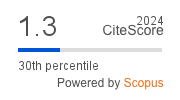Antibacterial potential of Ocimum sanctum oils in relation to Enterococcus faecalis ATCC 29212
Downloads
Downloads
Estrela C, Sydney GB, Figueiredo JAP, Estrela CRDA. Antibacterial efficacy of intracanal medicaments on bacterial biofilm: a critical review. J Appl Oral Sci. 2009; 17: 1–7.
Mozayeni MA, Haeri A, Dianat O, Jafari AR. Antimicrobial effects of four intracanal medicaments on Enterococcus Faecalis: an in vitro study. Iran Endod J. 2014; 9(3): 195–8.
Mishra N, Logani A, Shah N, Sood S, Singh S, Narang I. Preliminary Ex-vivo and an animal model evaluation of Ocimum sanctum's essential oil extract for its antibacterial and anti-inflammatory properties. Oral Health Dent Manag. 2013; 12(3): 174–9.
Saharkhiz MJ, Kamyab AA, Kazerani NK, Zomorodian K, Pakshir K, Rahimi MJ. Chemical compositions and antimicrobial activities of Ocimum sanctum L. essential oils at different harvest stages. Jundishapur J Microbiol. 2014; 8: 1–7.
Mediratta PK, Sharma KK. Effect of essential oil of the leaves and fixed oil of the seeds of Ocimum sanctum immune response. J Med Aromat Plant Sci. 2000; 22: 694–700.
Singh AR, Bajaj VK, Sekhawat PS, Singh K. Phytochemical estimation and antimicrobial activity of aqueous and methanolic extract of Ocimum sanctum L. J Nat Prod Plant Resour. 2013; 3: 51–8.
Bonjar GHS, Aghigi S, Nik AK. Antibacterial and antifungal survey in plants used in indigenous herbal-medicine of south east regions of Iran. J Biol Sci. 2004; 4(3): 405–12.
Kong X, Liu X, Li J, Yang Y. Advances in pharmacological research of eugenol. Curr Opin Complement Altern Med. 2014; 1(1): 8–11.
Mishra P, Mishra S. Study of antibacterial activity of Ocimum sanctum extract against gram positive and gram negative bacteria. Vol. 6, American Journal of Food Technology. 2011. p. 336–41.
- Every manuscript submitted to must observe the policy and terms set by the Dental Journal (Majalah Kedokteran Gigi).
- Publication rights to manuscript content published by the Dental Journal (Majalah Kedokteran Gigi) is owned by the journal with the consent and approval of the author(s) concerned.
- Full texts of electronically published manuscripts can be accessed free of charge and used according to the license shown below.
- The Dental Journal (Majalah Kedokteran Gigi) is licensed under a Creative Commons Attribution-ShareAlike 4.0 International License

















